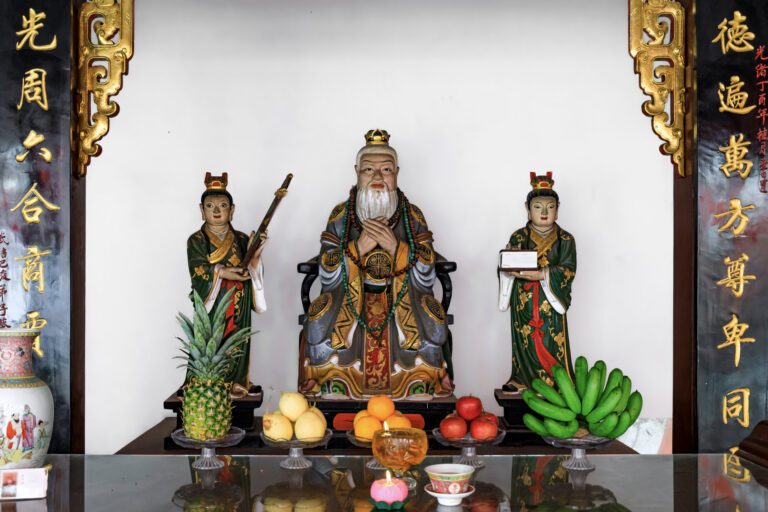Deciding which Chinese gods to worship at home can be a personal and profound journey. This decision can reflect your spiritual beliefs, your personal or family history, or even your hopes for the future.
In this article, we’ll guide you on how to select the most suitable Chinese god to worship at home.
Table of Contents
Understanding Chinese Deities
Chinese mythology and religious beliefs encompass a wide range of gods, goddesses, bodhisattvas, and other spiritual figures.
Some of these deities may be associated with general blessings and protections, while others have specific domains they preside over, such as wealth, health, or safety.
It’s essential to understand that the ‘form’ of the deity you choose should inspire a sense of compassion and fortune.
The statue should ideally be a wooden carved image, followed by brass. This ensures that after worship, a positive ‘association’ or ‘connection’ with the deity can be formed.
Common Deities to Worship at Home
There are several commonly worshipped Chinese gods suitable for home altars. Here are a few:
- ‘Amitabha Buddha’: Worshipped for peace, disaster relief, longevity, wisdom, and to remove karmic obstacles.
- ‘Guanyin Bodhisattva‘: Known for her many different forms, this deity is often prayed to for long life, peace, and auspiciousness.
- ‘Heavenly Mother’ (Mazu): A protector of those who travel by sea, she is also revered for prosperous business, disaster relief, and general protection.
- ‘Lord Guan’ (Guan Gong): Symbolising loyalty, righteousness, faith, wisdom, kindness, and bravery, Lord Guan is a popular choice among business people.
- ‘Tua Pek Kong’: A local deity often worshipped in the Southeast Asian region, he is considered a provider of wealth, prosperity, and good fortune.
- ‘Tu Di Gong’: Also known as the ‘Earth God’, he is viewed as a protector of a locality and its people, a provider of wealth, and a guardian against evil spirits.

In contrast, some deities are not typically recommended for worship at home. This includes deities with more ‘fierce’ or ‘wrathful’ expressions, such as the Tiger Lord, as well as ‘Yin’ gods or deities connected to the underworld or death, such as Yama, the King of Hell, and the Heibai Wuchang, who are associated with death and the afterlife. These deities often carry a solemn and stern energy that may not be suitable for a peaceful home environment.
When considering the number of gods to worship at home, it is essential to maintain balance and not overcrowd your altar or worship area. A simple rule to follow is the “Rule of Odd Numbers” which suggests that having 1, 3, 5, or 7 deities is more auspicious and harmonious. It’s also advisable to only worship one statue of each deity, as having multiple statues of the same deity can cause confusion and is generally seen as disrespectful.
However, it’s important to remember that the primary factor in any form of worship is sincerity. Whether you choose to worship one deity or several, your devotion and respect should be the guiding principles of your practice.
Remember, personal preference and faith are key considerations in choosing a deity to worship at home. It’s not about how many gods you have but the sincerity and faithfulness of your worship.
Making Your Choice
Your choice of which Chinese god to worship at home will depend on your personal circumstances, desires, and spiritual beliefs.
For instance, if you run a business and desire prosperity and fair dealings, Lord Guan or Tua Pek Kong could be suitable choices. For general blessings of peace, good health, and longevity, consider Guanyin Bodhisattva or Amitabha Buddha.
However, remember not to crowd your home with many gods merely for the sake of acquiring more ‘associations’. The key is sincere and devoted worship. Personal preference and intuition play a significant role, as you should feel a natural affinity and respect for the deity.
Considering the Compatibility of Deities
When choosing multiple deities to worship at home, it’s crucial to take into account their compatibility. This is based on the nature, characteristics, and the mythology associated with the deities.
For instance, traditionally, Buddhist and Taoist deities are not worshiped on the same altar. Similarly, deities associated with life and prosperity should not be worshipped alongside deities associated with the underworld or death.
Certain deities are believed to work well together and are often worshiped in conjunction. For example, the Sanxing or Three Stars – Fu (Prosperity), Lu (Status), and Shou (Longevity) – are commonly worshipped together as they represent the three qualities of a good life.
It’s also important to consider the positioning of deities on the altar. Usually, the main deity, or the one to whom you feel most connected, is placed in the center. The other deities are then arranged on its sides. However, never place a deity in a position where it directly faces another, as this can be seen as a sign of conflict.
Above all, it’s essential to approach this with respect and sincerity. Each deity should have its own space, and every item on your altar should be kept clean and tidy. When in doubt, seek guidance from a knowledgeable source, such as a spiritual mentor or a priest.
How to Choose a Good God Statue
Selecting a statue for worship at home is an essential step in creating your personal sanctuary. Here are some considerations to keep in mind:
A. Material
The material of the statue can range from wood, brass, or stone, to porcelain, resin, or gold. It’s best to select a material that you resonate with and one that fits the atmosphere of your home. For example, wooden statues are traditionally preferred as they bring a sense of warmth and serenity. Brass statues are next preferred due to their durability and classic appearance.
B. Size
The size of the statue is also significant. It shouldn’t be too big that it overwhelms your space, or too small that it gets overlooked. In Chinese customs, it is advised that the statue should not exceed 60cm for home worship.
C. Craftsmanship
The quality of the craftsmanship directly reflects your respect for the deity. A well-made statue not only adds aesthetic value but also brings positive energy. It’s worth investing in a statue that’s been crafted with care and attention to detail.
D. Representation
Choose a statue that correctly represents the deity. Each deity has certain symbols and attributes associated with them. For instance, Guan Gong is often depicted with a guandao (a type of Chinese pole weapon), symbolising his martial prowess.
E. Connection
Lastly, the most important factor is your personal connection with the statue. Does it evoke a sense of peace, reverence, or affinity within you? If yes, then it’s likely a good choice for your home worship.
In conclusion, choosing a Chinese god to worship at home involves a deep understanding of the deity’s attributes, your personal beliefs, and the physical space for worship. By carefully considering these aspects, you can foster a profound spiritual connection right in your own home.
Considering the Location for Worship in Home
Setting up your home altar is not just about having a space for your deity statue; it also involves understanding some basic Feng Shui principles to ensure that the energy in your home is conducive to worship.
A. Feng Shui Principles for Placing a Deity Statue
In Feng Shui, the placement of objects can significantly impact the flow of energy or ‘qi’ in a space. When setting up your home altar:
- Avoid placing your altar directly opposite the front door or in the bedroom, as these placements are considered disrespectful to the deity.
- The altar should be placed higher than the waist level to show respect to the deity.
- Keep the altar away from the bathroom or kitchen to avoid any negative energy.
B. Placement of Different Deities in Specific Areas of the House
Certain deities have recommended locations for their placement within the house:
- Guanyin Bodhisattva, symbolizing compassion and mercy, is suitable for the living room where the family gathers.
- The Earth God Tu Di Gong, providing protection to the locality, is usually worshipped outdoors or near the entrance of the house.
- Lord Guan and Tua Pek Kong, often worshipped for business prosperity, can be placed in the study or home office.
Properly Inviting the Chosen Deity into Your Home
After selecting and placing your chosen deity, the next step is to invite them into your home formally.
A. Importance of Rituals for Inviting the Deity
The process of inviting a deity is not just a ritual but also a way of showing respect and sincerity. It’s your way of welcoming them into your home and seeking their blessings.
B. Guide to Properly Carry Out These Rituals
The exact rituals can vary, but a basic guide would involve cleaning the statue, placing it on the altar, lighting incense, and making an offering of food or fruits. Pray sincerely, expressing your desire for the deity’s guidance and blessings in your home.
Maintaining Proper Worship and Relationship with Your Chosen Deity
After inviting the deity into your home, it’s essential to maintain a regular worship schedule and show your ongoing respect.
A. Regular Rituals and Offerings for Each Deity
Each deity has specific rituals and preferred offerings. For example:
- For Guanyin Bodhisattva, light incense and offer fresh fruits and flowers regularly.
- For Lord Guan, offerings could include wine and ‘guan dao’ paper replicas, particularly on his feast days.
- For Tu Di Gong, offerings typically include incense, fruits, and even cooked meals.
B. Importance of Sincerity and Respect in Worship
Regardless of the deity you choose, sincerity and respect should always be at the heart of your worship. It’s not about the value of the offerings you give, but the devotion and positive intentions behind your worship.
Choosing a Chinese god to worship at home is a personal journey, and it’s vital to select a deity that resonates with your beliefs and values. In turn, this will create a positive spiritual environment in your home.
Choosing a Chinese God to Worship at Home
In the vast tapestry of Chinese religious practices, choosing a deity to worship at home is a deeply personal decision that intertwines faith, tradition, and personal aspirations. Whether you lean towards the profound wisdom of the Buddha Amitabha, the compassionate nature of Guanyin, the righteous power of Guan Gong, or the earthly protection of Tua Pek Kong and Tu Di Gong, each deity has unique attributes that can resonate with different aspects of your life.
It is essential to remember that it’s not the quantity, but the quality of your devotion that counts. So, whether you choose to honor one or several deities, ensure to do so with sincerity, respect, and regularity. In doing so, you invite into your home not only the spiritual blessings of these deities but also a sense of peace, harmony, and wellbeing that comes from the act of worship itself.
Remember, your chosen deity should resonate with your values and aspirations, and your home should be a place of respect and sincerity towards them. As you embark on this spiritual journey, may you find peace, protection, prosperity, and above all, a deeper connection with the divine.
Now, it’s your turn to reflect – Which deity resonates most with you? And how do you plan to incorporate their worship into your daily life at home?
Can I worship more than one Chinese God at home?
Yes, you can worship more than one Chinese God at home, as long as there is no clash between the Gods. However, it’s essential to maintain a respectful relationship with each deity and not to overcrowd your altar.
Can I move my home altar once I’ve set it up?
It’s best not to move your home altar once it’s set up. The altar should be placed in a location that respects Feng Shui principles from the start to ensure positive energy flow.
Can I put statues of different Gods together on the same altar?
It depends on the specific deities in question. Some Gods are traditionally worshipped together, while others might not be compatible. When in doubt, seek advice from knowledgeable sources or your local temple.
What should I do if my God statue is damaged?
If your God statue is damaged, it’s recommended to respectfully replace it. The damaged statue should not be casually thrown away but should be treated with respect, ideally returned to a temple for proper disposal.
Can I worship the Chinese Gods at home without a statue?
Yes, you can. The statue serves as a focal point for your devotion, but what’s more important is the sincerity and respect you show in your worship. You can also use pictures or other representations if a statue isn’t available or practical.
Should I worship the God of Wealth at home?
While the God of Wealth, also known as Tsai Shen Yeh, is often associated with prosperity and financial success, it’s generally not recommended to worship this deity at home. The God of Wealth is considered a public god, often worshipped in temples or communal spaces for the betterment of the community or business district. In personal spaces like homes, it’s better to focus on deities that guide personal spiritual growth, protection, and familial harmony.
Which is the most popular and common Chinese God to be worshipped at home?
The most popular and common Chinese deity worshipped at home varies based on personal beliefs, family traditions, and regional practices. However, the Goddess of Mercy, Guanyin (or Kuan Yin), is one of the most widely worshipped deities in Chinese households. Known for her compassion, she’s often turned to for comfort and assistance in times of difficulty. For Taoist families in Southeast Asia, Tua Pek Kong and Tu Di Gong are commonly worshipped for prosperity and protection of the household.



